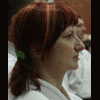Sen Nen Sugi Aikidojo Wrocław zaprasza do udziału w stażu z
Davinder Bath sensei 5 dan Aikikai, Londyn
Shidoin Birankai International
24-26 03. 2006
Adres: Hala Judo, ul. Zielińskiego 16 (boczna ul. J. Piłsudskiego)
Cena stażu – 70 zł
Godziny zajęć:
24.03 (piątek): 19.30 - 21.00
25.03 (sobota): 9.30 - 12.30 i 16.30 - 19.30
26.03 (niedziela): 10.00 - 13.00 i 18.00 - 19.30.
Prosimy o zabranie jo i bokken.
Nocleg – możliwy nocleg w dojo WSA, ul. Grabiszyńska 279 (budynek FAT)
Informacje szczegółowe, tel – 0507480656
[link widoczny dla zalogowanych Użytkowników]
[link widoczny dla zalogowanych Użytkowników]
D. Bath Sensei
How did you start Aikido, who was your teachers?
- A friend of mine had practised Aikido for a short while and told me I should try it; he said it was ‘the intelligent man’s martial art’. I was very curious after hearing that! A week later I went with my friend to try it out and fell in love with it straight away. I had a muscular but supple body so I could absorb most techniques without getting hurt and I really enjoyed putting techniques like Nikyo and Sankyo on other people. Very soon I learned some ukemi; the feeling of being thrown about was like nothing else in this world. I just wanted to do it again and again. This began in 1982 when I was just 19 years old.
My teacher was Sensei Vijay Sehdev who was a Student of Ralph Reynolds Sensei (head of The Aikido Fellowship school based in Birmingham, UK) and a friend and colleague of Donovan Waite Sensei (now a 6th Dan Shihan of Yamada Sensei’s school and the chief instructor of Philadelphia Aikikai, USA). Vijay who is now a judge was just a young lawyer at the time. Within months I was training with all three of them and trained five nights or more a week. I guess I was obsessed by it; and still am!
Then in 1986 when I had already been a Shodan for a year and a half, Vijay stopped teaching and Donovan moved to New York. The deeper questions were now beginning to haunt me. I asked Reynolds Sensei, ‘how do you know when you have found the right teacher?’ He gave me an answer that was to change things forever. He said ‘you will know when you find him, until then keep searching’. I had learned so much with the Fellowship but somehow it was not enough. It was time to expand my horizons.
I found three Aikikai teachers almost all at once, Chris Mooney Sensei, Peter Brady Sensei and Tony Cassells Sensei. Chris are Tony are now 6th Dan Shihans of course. I had learned amazingly flowing Aikido at the Fellowship and I was to learn solid technical Aikido with the Aikikai. But something inside was still missing.
Then in August 1987 at a summer school I met Chiba Sensei. I had heard many stories about him and had been preparing to meet him for some time. Immediately I felt a connection and love from him and he was like a loving father back to me. I knew this was the teacher I had been searching for. The search was over; Reynolds Sensei was right – I knew I had found him.
- After all those years what is the reason you still keep doing Aikido?
The answer to this question is very complex. The motivation is constantly changing. Enjoyment of training has always been an important factor; for the first 14 years it was also the pursuit of technical understanding and mastery; then I had realisation of Shoshin and discovered my centre and it became an obsession with analysis of ‘the centre’ and ways to transmit it. It indeed seems to be true that the more I learn, the more accelerated that learning becomes. The training and teaching is flowing from inside rather than merely copying of someone else’s form. How can I not continue training with all this interesting stuff going on inside?
- What do you think is the role of weapon practice in Aikido?
Chiba Sensei says that Aikido is incomplete without weapons, Iaido and Zazen. This is partly because these elements are necessary for the martial and spiritual heart of Aikido, after all weapons and spirituality were the father and mother of Aikido. They also act as ‘conditioning exercises’ to bring real depth to our understanding of Aikido. Through weapons training we sharpen our Zanshin, Maai and Martial Awareness. Weapons training helps us remove fragmentation and promote wholeness in our bodies. All these things are absolutely essential for Aikido body-art.

Staż - Davinder Bath Sensei we Wrocławiu
Rozpoczęty przez , Ponad rok temu
Brak odpowiedzi do tego tematu
Użytkownicy przeglądający ten temat: 1
0 użytkowników, 1 gości, 0 anonimowych
 FaceBook
FaceBook
10 następnych tematów
-
 Swego nie znacie, cudze chwalicie...
Swego nie znacie, cudze chwalicie...- Ponad rok temu
-
 Ankiety do magisterki - POMOŻECIE?:)
Ankiety do magisterki - POMOŻECIE?:)- Ponad rok temu
-
 Wiosenny staz NEAikikai
Wiosenny staz NEAikikai- Ponad rok temu
-
 Seminarium w Suchym Lesie i kongres instruktorów PFA
Seminarium w Suchym Lesie i kongres instruktorów PFA- Ponad rok temu
-
 czy to prawda?
czy to prawda?- Ponad rok temu
-
 Jak to jest z tą pomocą zaawansowanych kolegów?
Jak to jest z tą pomocą zaawansowanych kolegów?- Ponad rok temu
-
 40kg vs 80 kg - 40 kg wins!
40kg vs 80 kg - 40 kg wins!- Ponad rok temu
-
 Tori i uke
Tori i uke- Ponad rok temu
-
 Nie na temat
Nie na temat- Ponad rok temu
-
 Suchy Las -kto jedzie?
Suchy Las -kto jedzie?- Ponad rok temu




